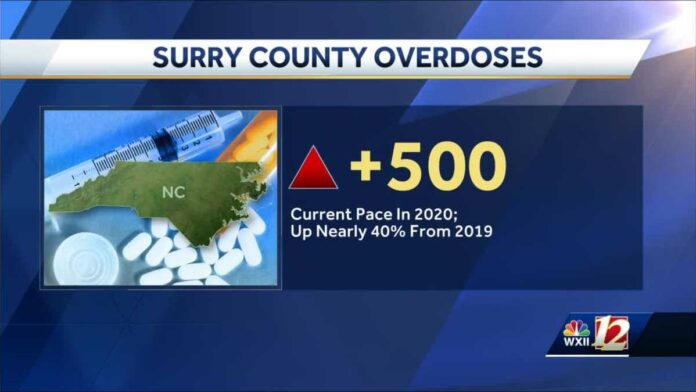Surry and Wilkes counties are reporting an increase in opioid overdoses and overdose deaths in 2020 compared to recent years because of the coronavirus. Health departments across the country are noting this increase as an unintended consequence of the extreme social isolation and financial uncertainty people are facing.Surry County In Surry County, emergency services officials said they are on pace for more than 500 overdoses. That would be the most in a single year ever, a nearly 40% spike from last year, and more overdoses than all of 2016 and 2017 combined.”The amount of overdoses that we are writing right now is probably not correct,” said John Shelton, director of emergency services in Surry County. “The reason being that Narcan is so readily available. A lot of these are turned around by Narcan … nobody’s ever notified. So you’ve got to have that ghost number out there, too, along with this, which is not good.”Surry County had 55 overdose deaths in 2017, 31 in 2018, 26 last year and is on pace for 28 deaths this year, according to Surry County emergency services.”I think this is Triadwide,” said Shelton. “I think it’s regionwide. I think it’s statewide. When we talk to our counterparts, they’re experiencing the same thing. I think it’s a statewide thing. I think it’s still a nationwide problem. I think it’s going to continue to be.”In comparison, Surry County reported two coronavirus deaths as of Thursday.Wilkes CountyIn response to the growing crisis, Wilkes County’s Opioid Response Program is launching a Naloxone Response Program to help prevent overdose deaths. The Naloxone Response Program is part of a three-year, $1 million initiative to decrease overdose deaths, rates of substance use disorder and HIV/Hepatitis C infection and to increase access to treatment and recovery services.Naloxone is a drug that can reverse opiate and opioid overdoses by restoring breathing. It is not harmful to people and cannot be abused, health officials said.The program will increase people’s access to Naloxone to help reverse as many overdoses as possible. To increase awareness about overdoses, the initiative will include a multi-media approach with the use of posters, rack cards, billboards, radio public service announcements and educational videos. The Opioid Response Program is a collaborative effort of local agencies including Project Lazarus, Wilkes County emergency medical services, AIDS Leadership Foothills Leadership Alliance, Mountain Health Solutions and Wilkes Recovery Revolution. It is funded through the Federal Health Resources and Services Administration and the Federal Office of Rural Health Policy.Anyone who needs help with substance abuse can call the Substance Abuse and Mental Health Services Administration national hotline at 1-800-662-4357 or the National Suicide Prevention Lifeline at 1-800-273-8255. They are 24/7, free, confidential and available in both Spanish and English.To find local treatment facilities near you, click here.
SURRY COUNTY, N.C. —
Surry and Wilkes counties are reporting an increase in opioid overdoses and overdose deaths in 2020 compared to recent years because of the coronavirus.
Health departments across the country are noting this increase as an unintended consequence of the extreme social isolation and financial uncertainty people are facing.
Surry County
In Surry County, emergency services officials said they are on pace for more than 500 overdoses. That would be the most in a single year ever, a nearly 40% spike from last year, and more overdoses than all of 2016 and 2017 combined.

Surry County Emergency Services
“The amount of overdoses that we are writing right now is probably not correct,” said John Shelton, director of emergency services in Surry County. “The reason being that Narcan is so readily available. A lot of these [overdoses] are turned around by Narcan … nobody’s ever notified. So you’ve got to have that ghost number out there, too, along with this, which is not good.”
Surry County had 55 overdose deaths in 2017, 31 in 2018, 26 last year and is on pace for 28 deaths this year, according to Surry County emergency services.

Surry County Emergency Services
“I think this is Triadwide,” said Shelton. “I think it’s regionwide. I think it’s statewide. When we talk to our counterparts, they’re experiencing the same thing. I think it’s a statewide thing. I think it’s still a nationwide problem. I think it’s going to continue to be.”
In comparison, Surry County reported two coronavirus deaths as of Thursday.
Wilkes County
In response to the growing crisis, Wilkes County’s Opioid Response Program is launching a Naloxone Response Program to help prevent overdose deaths.
The Naloxone Response Program is part of a three-year, $1 million initiative to decrease overdose deaths, rates of substance use disorder and HIV/Hepatitis C infection and to increase access to treatment and recovery services.
Naloxone is a drug that can reverse opiate and opioid overdoses by restoring breathing. It is not harmful to people and cannot be abused, health officials said.
The program will increase people’s access to Naloxone to help reverse as many overdoses as possible.
To increase awareness about overdoses, the initiative will include a multi-media approach with the use of posters, rack cards, billboards, radio public service announcements and educational videos.
The Opioid Response Program is a collaborative effort of local agencies including Project Lazarus, Wilkes County emergency medical services, AIDS Leadership Foothills Leadership Alliance, Mountain Health Solutions and Wilkes Recovery Revolution.
It is funded through the Federal Health Resources and Services Administration and the Federal Office of Rural Health Policy.
Anyone who needs help with substance abuse can call the Substance Abuse and Mental Health Services Administration national hotline at 1-800-662-4357 or the National Suicide Prevention Lifeline at 1-800-273-8255. They are 24/7, free, confidential and available in both Spanish and English.
To find local treatment facilities near you, click here.






